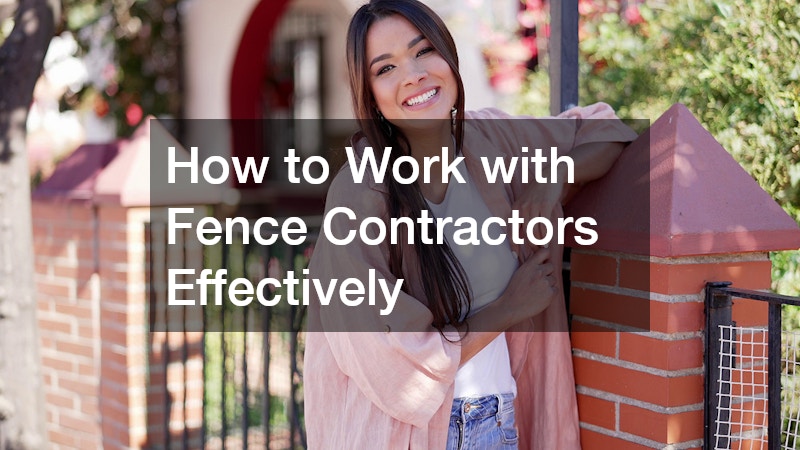Installing a fence is a smart investment for homeowners looking to boost privacy, enhance security, and add curb appeal to their property. But to achieve a smooth and successful outcome, knowing how to work effectively with fence contractors is essential. From hiring the right professionals to maintaining open communication and managing the project budget, each step plays a critical role in ensuring the job is done right.
Choosing the Right Fence Contractor
The first step toward a successful fencing project is hiring the right team. Not all fence contractors are the same—some may specialize in certain types of fences, while others offer broader experience or different quality standards. It’s important to do your homework.
Start by looking at licensing and insurance to confirm legitimacy and protection for both parties. From there, request references and check online reviews to get a sense of the contractor’s reputation. In addition to credentials and past performance, make sure to compare detailed estimates from multiple contractors. A good estimate should clearly outline costs for materials, labor, and any additional fees. Don’t just choose the lowest bid—look for a balance between competitive pricing and high-quality workmanship. A reliable contractor should be able to explain their process, give you a clear timeline, and answer your questions with confidence.
Understanding Common Fence Styles and Materials
One of the biggest advantages of working with experienced fence contractors is having access to a variety of fencing options. Before committing to a design, take time to consider what you need from your fence. Do you want complete privacy? Are you looking to keep pets enclosed? Do you prefer a decorative, open-style fence? Different materials also come with different advantages and maintenance requirements. Wood offers a classic and natural look but may need regular upkeep. Vinyl is known for durability and minimal maintenance, while aluminum offers a sleek, rust-resistant option. Chain-link fences are affordable and functional, especially for large perimeters. If sustainability is a priority, some contractors now offer eco-friendly materials, such as recycled vinyl or sustainably sourced wood. It’s worth discussing these options to see what aligns with your values and budget.
Communicating Effectively with Your Contractor
Clear communication is one of the most important parts of any successful contractor relationship. From the very beginning, you should clearly define your goals, timeline, and budget. Putting this in writing helps prevent misunderstandings later on. Staying in touch throughout the installation process helps keep things on track. A brief daily or weekly check-in can address progress updates, questions, or any changes that need to be made. This also builds a collaborative relationship, where you and your contractor feel comfortable sharing feedback. Even the best-planned projects may encounter hiccups. Whether it’s an unexpected weather delay or a material issue, handling problems respectfully and constructively will lead to better outcomes. Trustworthy fence contractors will always strive to resolve any concerns fairly and professionally.
Typical Costs Involved in Fence Installation
Budgeting for a fence installation involves more than just the price of materials. Labor costs, permits, equipment rentals, and even property-specific factors—like terrain or accessibility—can all affect the final price. That’s why it’s important to get a clear, itemized estimate upfront. Several factors can influence how much you’ll ultimately pay. Larger properties, complex layouts, or high-end materials will drive up costs. On the other hand, straightforward designs and budget-friendly materials can help keep spending in check. Many fence contractors offer flexible payment plans or financing options to help homeowners manage costs. Consider setting aside a buffer in your budget—typically 10% to 15% of the total cost—to cover any surprises or upgrades you might decide to add during the project.
Ensuring Quality and Longevity
Once your fence is installed, the goal is to keep it looking great and functioning well for years to come. This starts with choosing quality materials and skilled fence contractors who take pride in their work. A well-constructed fence won’t just stand the test of time—it will also enhance the overall value and appeal of your home. After installation, routine maintenance is key. Depending on the material, this could mean occasional cleaning, sealing, or painting. Even fences made from low-maintenance materials can benefit from occasional inspections to spot early signs of wear or damage. Should issues arise—like broken boards, rust, or leaning posts—addressing them promptly helps prevent bigger problems down the line. Many homeowners also choose to add enhancements later, such as decorative accents, additional gates, or updated hardware. Working with your original fence contractors on future upgrades can ensure consistency and compatibility with the existing structure.
Successfully working with fence contractors requires careful planning, smart decision-making, and clear communication throughout the entire process. By taking the time to choose a reliable contractor, understanding your material and style options, and maintaining involvement from start to finish, you’ll set yourself up for a smooth and rewarding fencing project. With the right team and approach, your new fence can offer both function and beauty for years to come.





